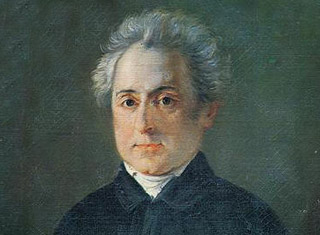Also known as:
Διονύσιος Σολωμός
More People of Greece
More Topic Categories
Related Destinations
Dionysios Solomos (08/04/1798 - 09/02/1857)
 Dionysios Solomos was a Greek poet, especially known for his poem Hymn to Liberty, whose first two verses became the national anthem of Greece and Cyprus. He is considered the national poet of Greece, not only because of the anthem, but also because he utilized traditional poems and Modern Greek language.
Dionysios Solomos was a Greek poet, especially known for his poem Hymn to Liberty, whose first two verses became the national anthem of Greece and Cyprus. He is considered the national poet of Greece, not only because of the anthem, but also because he utilized traditional poems and Modern Greek language.Born in Zakynthos in 1798, he was the son of a count and his maid. He spent his childhood on the island, under the supervision of his teacher, Abbot Santo Rossi, an Italian refugee. After his father’s death, he went to Italy for studies, as it was customary at the time for the children of noble families in the Ionian Islands. He completed his secondary education in Venice and Cremona, and enrolled in the Law School of Pavia University in 1815. He graduated in 1817, but he was already greatly influenced by Italian literature; in fact, he started writing poetry in Italian. He was also acquainted with very important Italian scholars, surrounding him on a veil of the French Enlightenment.
Solomos returned to Zakynthos in 1818 after his studies. As the island was a hub of culture since the 18th century, Solomos immediately associated with many people interested in literature. He still wrote poems in Italian, but started made his first attempts in Greek poems, something particularly hard, considering that he neither knew the Greek language well, nor were there many poems in Modern Greek to study. Instead, he studied traditional Greek songs, written in Modern Greek.
In 1823, he completed his first major poem in Greek, the Hymn to Liberty, which was inspired by the Greek War of Independence of 1821. The poem was published in Greece in 1824, and in Europe, in Paris in 1825, thus spreading the fame of Solomos. This poem marks the start of a new era for Solomos, as at this point he was able to use the Greek language in complex forms and expand his sources of influence. In 1828, a dispute with his brother made him relocate to Kerkyra (Corfu), which was also an important cultural hub of the era. He started studying German romantic philosophy and literature and continued developing his own poems.
In the years 1833 to 1838, and while he had reconciled his differences with his brother, a series of trials upset his life; his half-brother (on his mother’s side) claimed that he was also the son of Count Solomos, asking for a portion of the inheritance. Although the result of the trial was in favour of Dionysios, his relationship with his mother was disrupted, mainly due to her attitude. Nevertheless, the poems he wrote after 1833 are considered to be the most complete and mature of his works. His best poems are The Cretan (1833), and The Free Besieged (1845).
After 1847, Solomos started writing in Italian once again. This period of his life is characterized mostly of incomplete poems. In 1851, his health started deteriorating and became even more secluded than previously. He died in 1857.
See Also:
 Athens Photos
Athens Photos
 Santorini Photos
Santorini Photos
 Crete Photos
Crete Photos
 Meteora Photos
Meteora Photos
 Corfu Photos
Corfu Photos



